The Cost of Cheap Energy: Dangote’s Industrial Push for Coal Leaves Benue’s Rivers Poisoned. Now, Communities are in Health Peril
Eighteen Indigenous communities, including Otukpo, the traditional home of the Idoma ethnic group in Benue State, are in danger as a result of a coal mining operation by Dangote Coal Mines Ltd, a subsidiary of Dangote Group.
Southern Herald’s THEOPHILUS ADEDOKUN reveals how deadly contaminants such as Lead, Arsenic, Mercury and Cadmium from Dangote Coal Mine sites seep into the major water source for communities in Benue South Senatorial District, cause intra-communal killing and adopted the Ghana mining law to rob Benue communities of compensation. This report also documents the company’s disregard for environmental global practices and mining regulations.
DEATH flashed before Gabriel Ocheke in March last year. His life almost left his body if not for the intervention of quick medical intervention that saved the situation. It was a traumatic experience that still haunts him to this day.
The forty-year-old native of Aokete, Ekenobi in Eke ward, Okpokwu LGA of Benue State, like other members of his community, had relied on River Okpokwu for daily use until it became contaminated in 2020.
Gabriel Ocheke displays the scar left by a surgical operation on his stomach. His ailment was linked to the intake of water from the contaminated River Okpokwu. Photo credit: Adedokun Theophilus/Southern Herald[/caption]
Despite the contamination, Gabriel and his family continued to drink from the river, utilising the water for cooking and bathing because there was no better alternative.
Families that could afford sachet water (pure water) have completely abandoned the river water, even though it is a more expensive option. The rest have to contend with living with multiple plagues such as body rashes and other infections. Later on, Gabriel began to experience discomfort all over his body.
This aggravated to dizziness until he became critically ill and was diagnosed for surgical treatment.
“My stomach began to swell up and I felt pains all over my body and a serious headache,” he told Southern Herald.
The medical practitioner diagnosed him with bowel perforation caused by contaminated water. Research confirms that abdominal bloating and pains are linked to the consumption of toxic and heavy metals, which include lead, mercury, and arsenic.
Southern Herald confirmed from experts that coal mining activities by companies such as Dangote Coal Mines, a subsidiary of Dangote Group could be responsible for polluting freshwater bodies and threatening the environment in Benue State.
Yet, regulatory agencies such as the Ministry of Solid Minerals Development, the Mines Cadastral Office, the National Environmental Standards and Regulations Enforcement Agency (NESREA) and the Benue State Ministry of Mineral Resources shy away from holding the company accountable for environmental pollution.

The activity of Dangote Coal Mines is against Section 123 of the Nigerian Minerals and Mining Act (NMMA) 2007, which forbids the contamination of freshwater bodies and waterways. The company’s operation also breaches Section 111, which states that environmental pollution must be prevented.
Tanimola Akande, the erstwhile National Chairman of the Association of Public Health Physicians of Nigeria and Professor of Public Health at the University of Ilorin told Southern Herald, that humans and aquatic life can be at grave risk from coal mine discharge. The discharge and toxic metals can lead to dysfunction of the nervous system, neurological damage, cancer and the destruction of the body organs, he said.
Akande cautioned persons residing within the proximity of contaminated water to avoid drinking such contaminated water.
Several studies confirm that pollutants, contaminants, and chemicals that escape from coal mines can lead to severe skin diseases and cancer. Critical health problems like skin and bladder cancers, neurological illness, an increase in tumours, kidney problems, hypertension, liver cirrhosis and skin irritation are said to be linked to some hazardous chemicals that are being discharged into the environment during coal exploration, washing, and other processes in mining areas. However, other non-coal-mining-related pollutants can upsurge the danger of chronic and acute disorders when problems are experienced after prolonged exposure.
“We are helpless, but we cannot do anything. We have cases of typhoid, malaria and respiratory diseases every time,” said Ejembi Enokela, a medical clinical student at the University of Abuja Teaching Hospital and native of Ekenobi, attributing a high incidence of illness to the polluted water.
Apart from Ekenobi village, Southern Herald found that Otukpo and seventeen other villages downstream of the Dangote mining sites are endangered by the pollution that has been consistent for four years. The water crises have fueled medical emergencies for many households.
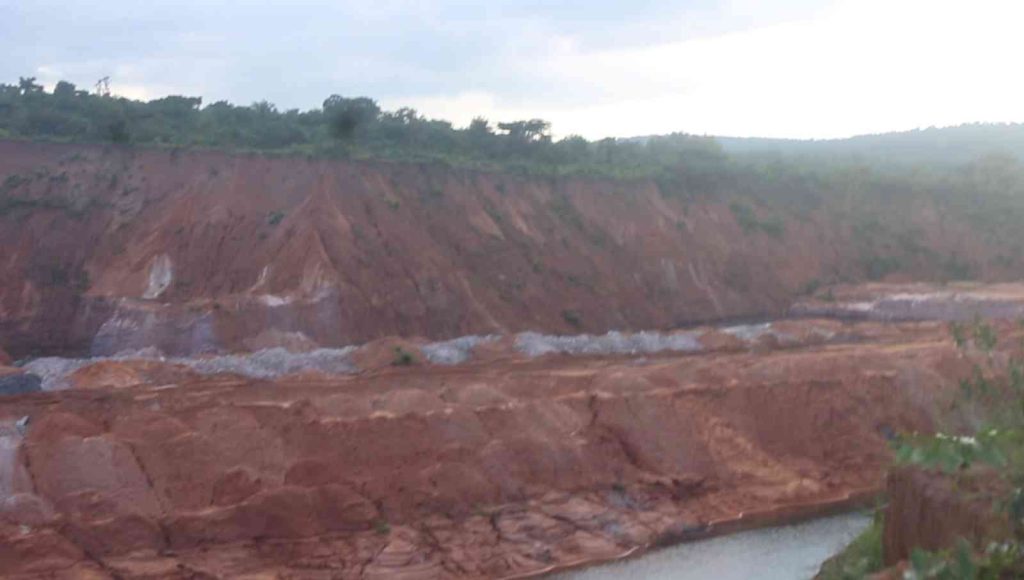
Another mining pit serves as a veritable source of contamination of freshwater bodies. Photo credit: Adedokun Theophilus/Southern Herald
Communities that are impacted include Ondo, Umabe-Ehaje (Aokpe), Ai’Okekwu (Ugbokolo Ward), Ijege, Oduda, Ogwudoja, Otobi, Opidlo, Ogene, and Ogbodo (Amejo Ward).
Others are Ogblega, Aokpasu, Omukwu, Jericho and Aokete (Ekenobi) (Eke Ward), as well as Ochobo community, according to a document obtained by Southern Herald.
These communities depend on waters from River Okollo and River Umabe, both heavily contaminated by runoff from the mining sites. While Okollo runs into Umabe, the latter joined with River Ohimini, which is also contaminated, to form River Okpokwu at Ochobo in Ohimini Local Government Area of the state.
River Okpokwu runs through many other communities down to Otobi Town in Otukpo LGA. The Benue State Water Works is located in Otobi, and the city of Otukpo is served from there.
Diseases and Deaths
The condition of living is worse in Ogblega village.
Troubles and tribulations are in every corner of the community. The stories and agonies of diseases, depression and deaths linked to the polluted water are pervasive.
Not only are most people discontented but they are also disconnected from the reality of a comfortable life other than their insect-infested environment and farmland. Ogblega is cut off from basic amenities, including portable boreholes, accessible roads, schools and healthcare facilities.
Seated on a blue plastic chair and hoarded by flies waiting to perch on his body, Oko Hyacinth, the National Chairman of Ogblega in Ekeh ward, told Southern Herald that many of the children in the community are down with different illnesses, which medical health workers in a faraway neighbouring village linked to water.
“The river is polluted but we still use it to cook, it is affecting us. Sometimes when we take the children to the hospital, they will say bad water and the doctors will ask about the kind of water our children use.
“Some of them are taking treatment up till now because of the water,” he said as his face, sunken and voice laden with sadness.
Hyacinth explained that the villagers drank the turbid water seen by Southern Herald at the time of the visit.
Multiple interviews by Southern Herald showed that the negligence of government interventions is complicated by Dangote’s pollution. This contradicts the National Environmental Standards and Regulations Act (2007) which is meant to enforce compliance with policies, standards, legislation and guidelines on water quality, environmental health, sanitation, and pollution reduction. The regulation emphasised NESREA’s cooperative efforts to protect the country’s air, land, seas, and other water bodies from pollution and other forms of environmental degradation, as well as to restore and improve the environment and natural resources of the country.
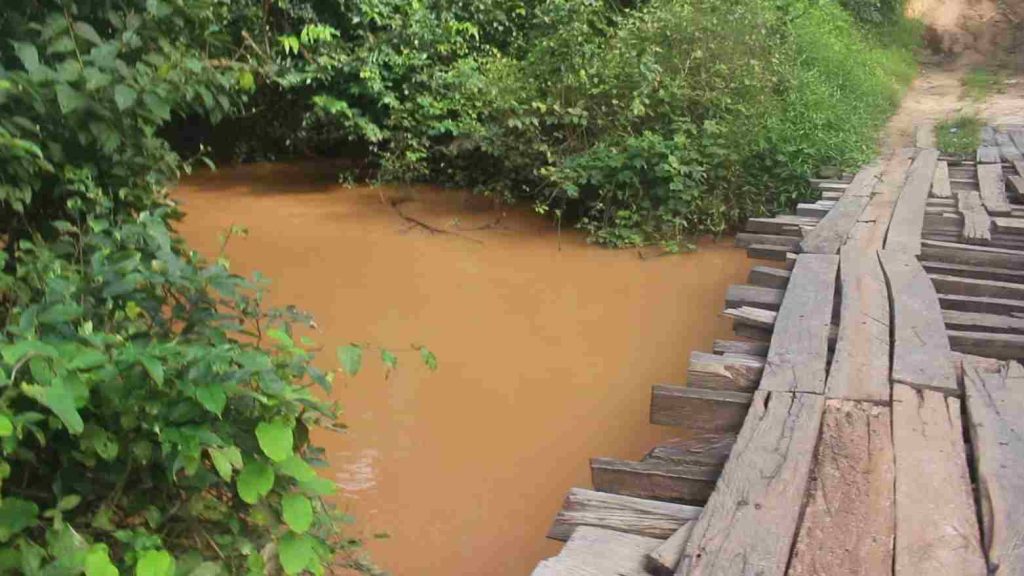
A makeshift wooden bridge in which the murky River Umabe passes through in Ogblega community. This is the water community members drink Photo credit: Adedokun Theophilus/Southern Herald
Interviews showed that deaths from water-borne diseases like diarrhoea, typhoid, serious malaria and other unidentified ailments are prevalent in the community.
Sunday Iko and Janet Obela are among the casualties of illnesses linked to water pollution. Findings by Southern Herald indicated that Sunday died in 2021 and Janet in 2022. Both passed away in their mid-fifties.
“Sundaydied from diarrhoea. There was no healthcare facility to attend to him and there was no borehole as well,” said Mike Agida, a native and lecturer at Alex Ekwueme Federal University, Ndufu-Alike, stating that the dearth of government support has forced the villagers to drink the water continuously. He pointed out that nothing changes in this circumstance all year long.
Experts explained that multiple heavy metals like cadmium, lead, arsenic, and mercury in drinking water have additive or synergistic toxic effects, stressing that this can worsen the risks for organ damage, cancer or neurological issues.
Dr Michael Olarewaju told Southern Herald that direct exposure to coal dust and toxic substances influences these health trends in Ogblega. He pointed to the crises in the village as a broader environmental and economic impact of coal mining while proposing that a combination of environmental control measures, improved access to healthcare, public awareness, and community-led action can lead to a significant reduction in the health risks for populations impacted by coal mining.
Dangote’s environmental disaster goes beyond mere pollution, it complicates the health and living conditions of communities. Every person who uses water in tandem with mining operations needs to ensure that the water does not include detrimental contaminants in amounts that might be harmful to plant or animal life, according to Section 124 of the NMMA. Still, the case is different as this becomes pervasive.
Dangote pollution aggressively undermines the United Nation’s Sustainable Development Goals (SDG) 6, which sought to guarantee that all people access clean water and sanitation by 2030. Improving water quality, lowering pollution, getting rid of dumping, and minimising the release of dangerous chemicals and materials were part of the development goals that were infracted.
Even though water-borne diseases are preventable, it is a major threat to health worldwide, according to a study that notes that the absence of financial resources, leadership, and suitable prioritisation hinders billions of people from accessing clean water globally. But then, Southern Herald’s findings are different as the struggle for water is a bigger challenge for all communities that depend on the rivers that Dangote Coal Mines Ltd polluted.
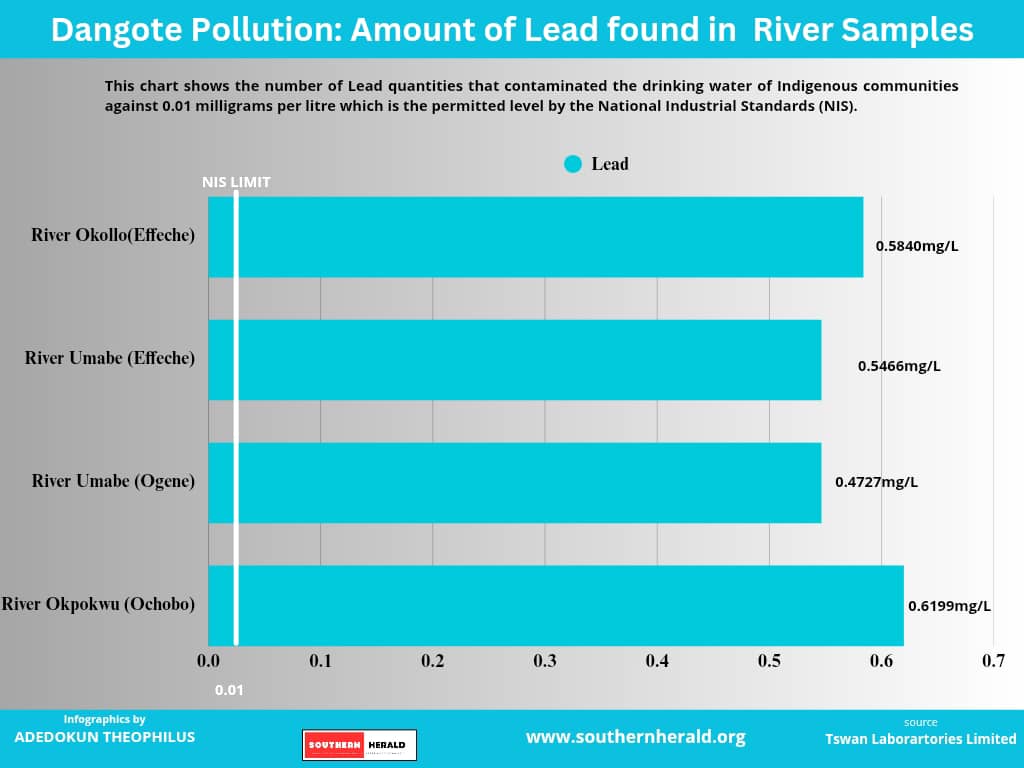
Water-borne diseases across these communities are pronounced. Multiple interviews by Southern Herald with natives who reside along the bank of the rivers downstream channels of the polluted rivers from Effeche-Akpali to Ekenobi indicated.
At Ochobo, distress from water contamination hangs like a heavy blanket. There are a few houses with a couple of boreholes drilled and owned by affluent individuals, but the majority depend on the polluted River Okpokwu. As a result, the community is marked by health issues due to the inescapable regular use of murky water from polluted rivers.
Southern Herald visited the banks of the River Okpokwu and witnessed the struggles of ordinary residents of Ochobo.
We met Abu Monday and Steven Francis, who had filled theirs with the murky water in a corner. This turbid water was meant for domestic usage. The teenagers took turns taking a bath and brushing their teeth. They did not bother, despite their awareness of the pollution and its implications for their health.
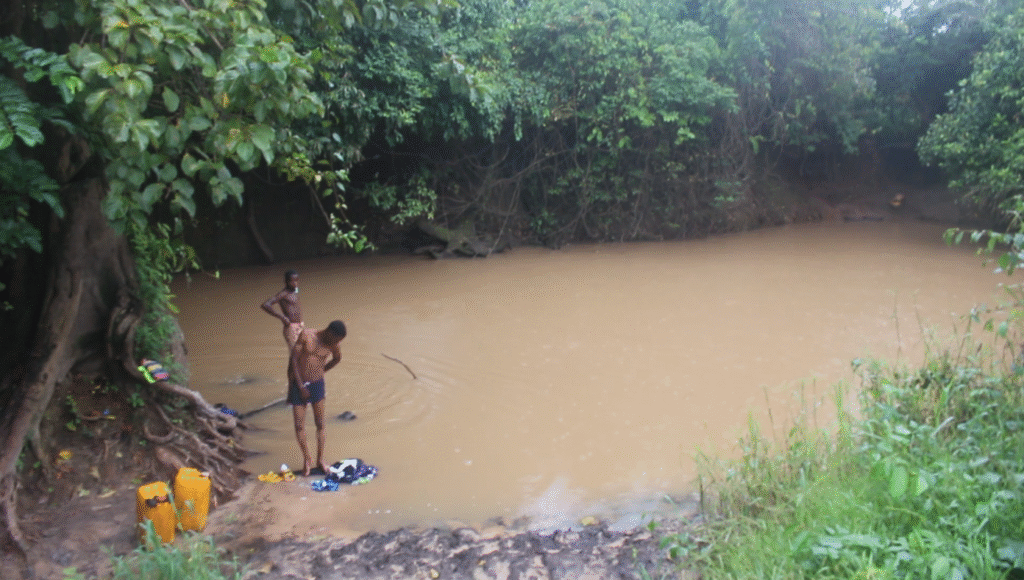
Although Monday said his family now drinks sachet water, they depend on the water from the river for other uses. “The day I drank this water, I had an unsettled stomach and pain. I cried tirelessly because the pain was unbearable and I’ll not drink it again,” he recalled in a sombre note of finality.
Another resident of Ochobo, Happiness Ben is furious due to the dermatological effects of contaminants from the River Okpokwu. She is also worried about the health implications of the water in her internal organs. “Since I came back, I have been using the water to cook and bathe. The next thing I started having rashes, and if it could bring rashes on my skin, I don’t know the internal effects.”
Studies indicate that the usual price for mining activities is very high due to the unavoidable contamination of freshwater bodies by heavy metals. Such contaminated waters are naturally dangerous for consumption and, indeed, unusable for cooking and other uses.
However, in situations where polluted water cannot be evaded, long-term health monitoring and rehabilitation are mandatory to avert health disasters. Reinnet Awoh explained to Southern Herald the need to provide clean and safe water, stressing the importance of community awareness campaigns on the risks of using polluted water.
“People exposed to heavy metals will need long-term health monitoring. Regular check-ups can help catch any ongoing health issues early, like kidney disease, neurological damage, or developmental delays in children. This is especially important since the effects of heavy metal exposure can show up months or even years later.
“For those who have already experienced health problems due to exposure, rehabilitation might be necessary. This could involve therapies to improve cognitive or motor function if they’ve experienced brain or nerve damage from mercury or lead poisoning,” he cautioned.
Waterpreneurs everywhere, no safe water
Due to the large number of communities suffering from pollution, the demand for safe water has increased as the danger of drinking from poisoned rivers gradually dawns on residents. This has led to a surge in waterpreneurs, a new business in water supply which has now become a new economic life in the different villages.
Aokpasu in Eke ward and Ogene in Amejo ward are two communities where the water supply business flourishes with increasing patronage. Southern Herald, however, gathered that this practice does not guarantee quality or clean water while most waterpreneurs sourced their water from either River Umabe or River Okpokwu.
Although the pollution caused by Dangote mining activities triggered a wave of protests three years ago, the company planned to drill boreholes to mitigate this problem.
Aokpasu and Ogene are two of the four communities set to benefit from boreholes drilled by Dangote Group in the first quarter of 2021 following a wave of protests against the pollution, the boreholes have however been abandoned and remained uncompleted.
The management of Dangote Coal Mines, according to information gathered by this reporter, rather than complete the first phase of the boreholes and proceed to the other communities, chose the option of bribing political and community leaders in the local government, traditional chiefs, and youth leaders who initially championed the protest against the mining pollution by putting them on a monthly payroll.
Recalling with tears welling in his eyes the incidents that brought false hope, the chairman of Aokpasu, Daniel Eyah, says: “Dangote came to drill a borehole but it couldn’t get water after two days. They, however, filled the dug hole with water from the river to deceive us and since then the borehole has been abandoned. We are forced to buy from tankers who fetch from the same river a few kilometres away or drink the polluted river. The same water they bring is red and it is fetched from Okpokwu.”
He expressed his disdain for the irresponsibility and carelessness of Dangote company. Explaining that many families spend thousands of naira monthly to get unclean from tankers, he also says: “It is every individual and some people will buy N5,000 while a jerry can be sold at N100.”
The clean water source available to the residents of Aokpasu is located between six and seven kilometres away, and they were forced to drink from the tainted river. In addition, large tanks and reservoirs are installed in every house to preserve rainwater channelled from zinc roofs.
Southern Herald gathered that many people were forced to relocate from Aokpasu due to pollution issues and have moved to areas with access to clean water. “The cost of sachet water is high and we spend a minimum of N700 on a bag. Most people are leaving,” lamented Martha Odeh, a female resident.
Like Aokpasu, Ogene Community is also severely affected by the pollution and the residents who can afford it also depend on pure water or bottled water. At the same time, the majority continue to drink the poison from River Umabe.
Speaking on the upsurge of cholera and typhoid cases in the community, a septuagenarian widow, Christiana Etuka, lamented to Southern Herald that polluted supplies from tankers are what they get in return for their money.
“We use this Umabe water to cook, drink and bathe and it was very pure. But things have changed since Dangote started mining. We know the water is no longer good. I often have stomach pain after drinking it. There are many situations where people drink from the river and find themselves in the hospital.
Benedict Ameh, the Chairman of Ogene Community, shows Southern Herald the marked point of a borehole said to have been drilled by Dangote in 2022 beside the Community Hall. The company is said to have abandoned the project. Photo credit: Adedokun Theophilus/Southern Herald
“Anytime there is rainfall, we minimise our water usage till another rainfall. During the dry season, we have no option but to continue to drink from the river. Whenever our children and grandchildren come home from the cities, they no longer drink Umabe water but pure water or bottled water,” the window lamented, decrying that the water is perpetually brownish with tiny particles even if there were no rainfalls.
Many residents of the affected communities believe that Dangote Group is deliberately poisoning them as the company, in acknowledging that River Umabe has been polluted and not healthy for drinking, had in 2022 drilled four boreholes which it later abandoned.
Southern Herald findings indicate that Dangote’s coal mining exploration breaches the Nigerian Mining and Minerals Act (NMMA) (2007). Section 125, subsections a and b, state that communities affected by pollution and damages due to mining activity shall be compensated.
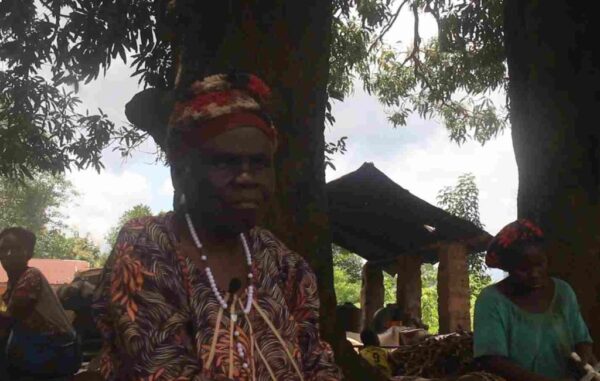
Mrs Christiana Etuka sitting and slicing cassava under the tree. She is a widow. Photo credit: Adedokun Theophilus/Southern Herald
The chairman of Ogene-Amejo community, Ameh Benedict, said that the devastation and health crises caused by Dangote mining activities have been immeasurable, adding that the company’s abandoned borehole has become a curse rather than a blessing because it is not dormant. “We don’t have any borehole water in the community. We have been using this water and have no complaints because our forefathers drank from it but the mining operation has destroyed everything.”
He, however, called on the federal and state governments to provide drinkable water for the community to mitigate water-related crises.
Nuhu Elujah, the General Manager of Special Duties at Dangote Coal Mines Ltd, told Southern Herald that the company executing the projects was planning to return to complete the construction of the boreholes. He explained this during an interview with Southern Herald in the early months of the year.
According to him, Dangote’s contract with the company that drilled the four boreholes had been terminated and he promised that a new firm with better credibility had been awarded the contracts by the headquarters of the company, noting that the contracted entity is awaiting mobilisation to return to the communities to complete the abandoned infrastructures.
Poisons in Pots, Plates, Cups and Pans: Laboratory Analysis Linked Deadly Chemicals In Rivers to Coal Mines
The by-products of coal seams, topsoil and remnants of coal from the mine sites are often drained first into River Okollo, and then to River Umabe and River Ohimini. These rivers all take their sources from the hills of Effa in Ugbokolo ward. These dangerous chemicals seep into the ground and are ultimately washed away when rains fall into surface water, perpetually dumped in the two rivers.
These chemicals, known as heavy metals, are dangerous to human health and are related to the recurrent coal exploration of Dangote Coal Mines, Southern Herald found out. This flows through Okollo, Umabe and Ohimini rivers, onto River Okpokwu and further downstream up to Benue State Water Works, Otobi-Akpa in Otukpo LGA.
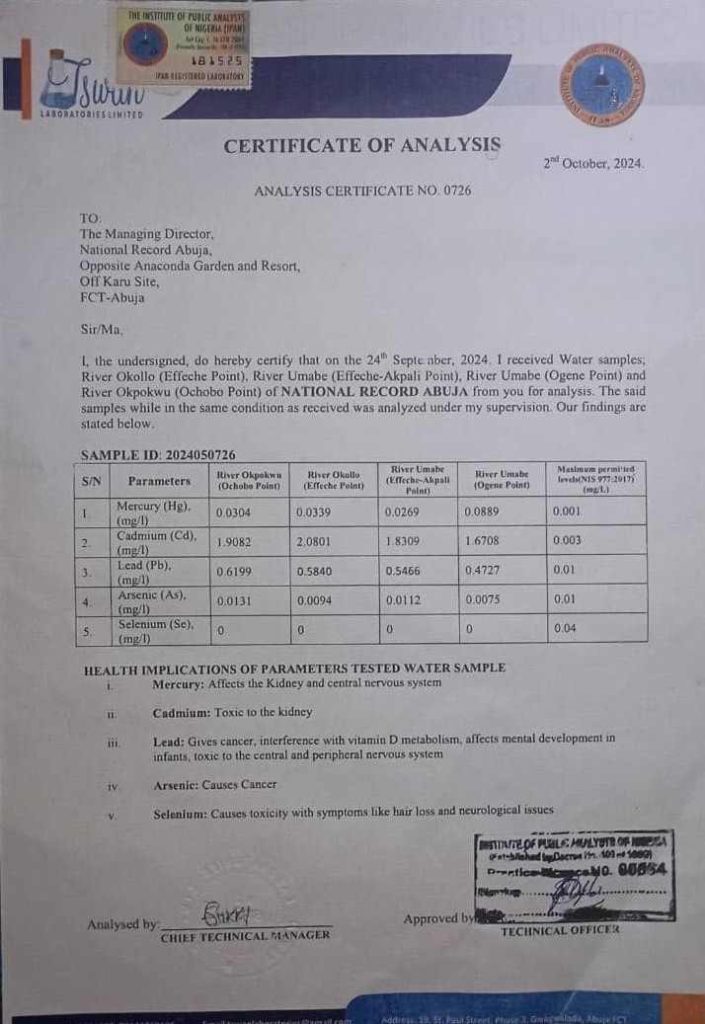
Southern Herald took water samples from four different locations and three different rivers. Samples were taken from River Okollo in Effeche Village, River Umabe in Effeche-Akpali, River Umabe in Ogene Amejo Village and River Okpokwu in Ochobo Village.
River Okollo is closest to the mining sites and it flows into River Umabe, whose source is also very close to the mining sites. Umabe meandered downstream through several contiguous villages in Ugbokolo, Amejo and Eke wards, which combined with other communities to form Edumoga District. Rivers Umabe and Ohimini joined to form a bigger River Okpokwu in Ochobo Village.
Southern Herald submitted samples of the murky water to Tswan Laboratories Limited, Abuja, a certified scientific laboratory by the Institute of Public Analysts of Nigeria (IPAN), on September 24 to analyse five major chemical substances related to coal mining. The analysed chemicals in the samples are mercury, cadmium, lead, arsenic and selenium.
A result of the water assessment received on October 2, 2024, revealed that four out of five heavy metals are substantially present in the samples. Findings show that the examined samples from these rivers, which residents of at least 18 communities drink from and use in various domestic chores, have elevated levels of toxic heavy metals and other pollutants.
In plain language, the analyses of samples show that the levels of heavy metals detected in the water from the rivers exceed WHO limits as well as the Nigerian Industrial Standard allowable level.
The Nigerian Industrial Standard (2007) for water quality is a policy set to ensure the protection of consumers. It aims to speed up the upgrading of non-protected water systems and improve the management of all drinking water systems in the country.
The analysis revealed that River Okollo (Effeche point), River Umabe (Effeche-Alkapli point), River Umabe (Ogene Village point), and River Okpokwu (Ochobo Village point) have high Mercury concentrations.
As compared to the maximum levels allowed by the Nigerian Industrial Standard (977:2017) of 0.001 milligrams per litre (mg/L), the results showed that Mercury had 0.0339 (mg/L) in River Okollo (Effeche point), 0.0269 (mg/L) in River Umabe (Effeche-Alkapli point), 0.0889 (mg/L) in River Umabe (Ogene village point), and 0.0304 (mg/L) in River Okpokwu (Ochobo point). This showed that the milligram per litre found in this water is exceedingly high and perilous to the health of natives who come in contact with it.
Exposure to Mercury in large quantities can be lethal and negatively affect the central and peripheral neurological systems, the lungs, the kidneys, the immunological system, and the nervous system according to the World Health Organisation. It stressed that if swallowed, the inorganic salts of mercury may cause renal poisoning and are corrosive to the skin, eyes, and digestive system.
“People living around such water sources should avoid the use of such water sources for drinking. The government needs to take appropriate steps to prevent the contamination of water sources and also provide potable water for such communities,” Professor Tanimola told Southern Herald. Tanimola stressed the need for regulatory authorities to halt mining activities that lead to pollution and sanction the company involved.
Examination of the samples (water) that were obtained revealed the rivers contain a considerable amount of Cadmium. Cadmium in the water is much higher than the maximum allowed level of NIS, which is 0.003 (mg/L), according to the analysis result.
The analyses state that a concentration of 2.0801 mg/L was found in River Okollo (Effeche point), and 1.8309 mg/L was detected in River Umabe (Effeche-Alkapli point). 1.6708 mg/L River Umabe detected in (Ogene Village point) and River Okpokwu (Ochobo point) contains 1.9082 (mg/L), respectively.
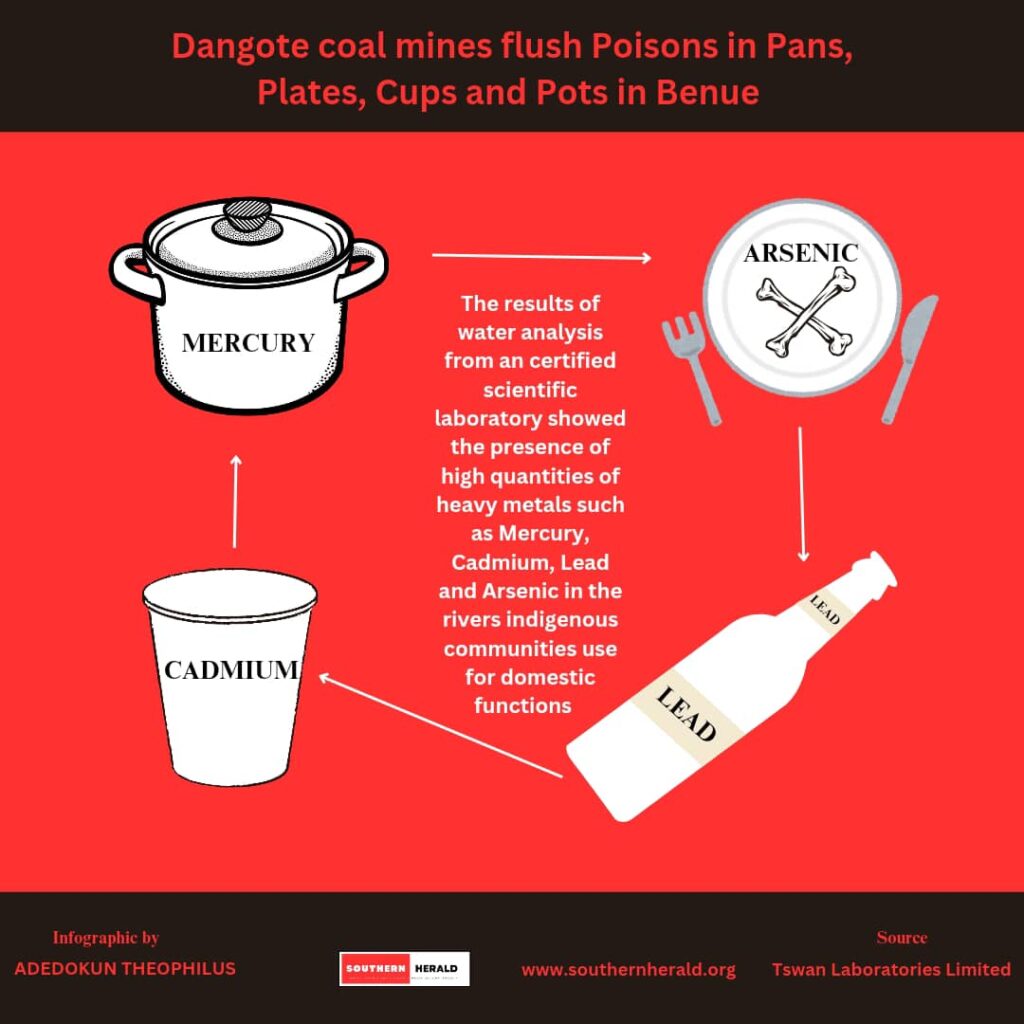
Infographic representing four deadly chemicals found in the river. Photo Credit: Adedokuun Theophilus/SouthernHerald
Chronic ingestion of Cadmium through contaminated water is linked to an increased risk of cancer based on the International Agency for Research on Cancer (IARC) findings, and this is peculiar to lung and prostate cancer. It pointed out that its exposure could contribute to kidney damage over accumulated time.
A former Secretary of the Nigeria Medical Association (NMA), Federal Capital Territory chapter, Dr Michael Olarewaju, clarified to Southern Herald that nephrotoxicity (kidney damage), bone deterioration and destruction, lung disorders, heart problems, and hypertension are all closely related to Cadmium exposure, supporting the study of IARC.
Analyses in a comparable suite revealed levels of Lead in the water are higher than the NIS threshold of 0.01. Findings showed that 0.5840 mg/L was detected in River Okollo (Effeche point) and 0.5466 mg/L in River Umabe (Effeche-Alkapli point). River Umabe (Ogene village Point) and River Okpokwu each have 0.4727 mg/L and 0.6199 mg/L of lead.
River Okpokwu has the highest amount of Lead, 0.6199 microgrammes per deciliter, nine times more than the WHO’s recommended level of 5 microgrammes per deciliter.
A global think tank on health research, the Institute for Health Metrics and Evaluation (IHME) attributed millions of neurological impairments and deaths worldwide to Lead. It elaborated on how it is a serious environmental health concern, especially in low–income and developing nations where lead contamination of the food, water, and air persists.
To avert future illnesses and greater restrictions on industrial pollution, Professor Akin Osibogun, a specialist in public health suggested an improved oversight of mining operations, and the phase-out of Lead in consumer products are required.
There is more to these chemicals. Southern Herald study revealed that two of the four samples (of the water) showed the presence of Arsenic. The maximum limit for Arsenic is 0.01 mg/L.
The samples of the river water from River Umabe, River Okollo, River Umabe (ogene Point) and River Okpokwu (Ochobo Point). Photo Credit: Adedokun Theophilus/Southern Herald
Investigation showed that the concentrations of Arsenic in the River Okollo (Effeche point) and River Umabe (Ogene point) are at 0.0094 mg/L and 0.0075 mg/L, which are remarkably low. Studies attributed this to numerous environmental and geochemical factors due to inconsistencies in the amount of Arsenic in connected rivers.
Beyond factors like the potential of hydrogen, temperature, and seasonal changes, which can cause disparities in Arsenic levels across connected streams, human interaction and activities like water extraction, irrigation, and chemical usage can disrupt these natural balances and influence Arsenic distribution across interconnected waters.
Conversely, River Okpokwu (Ochobo Village) measured 0.0131 mg/L, while River Umabe (Effeche-Alkapli point) recorded 0.0112 mg/L, which exceeds the maximum allowed limit of 0.01 pegged by NIS. This excessive exposure to Arsenic is connected to memory loss, childhood developmental delays, diabetes, skin lesions, reproductive issues, and cancers of the kidney, lung, bladder, and skin, according to a study by the Global Burden of Disease Research 2021.
It further explained that Arsenic disrupts the endocrine system, which is indispensable for regulating body functions like metabolism and growth.
Groups of heavy metal concentrations such as Cadmium, Lead and Iron in surface water in the communities were reported insignificant or below the detected limit before the commencement of the mining operation, according to the Environmental and Social Impact Assessment (ESIA) obtained by SouthernHerald. This ESIA is alleged to be unapproved by the Ministry of Environment. It disclosed that the concentration is lower than the permissible level in drinking water based on the Standard of National Environmental (Surface and Ground Water Quality) Regulations and WHO (2008).
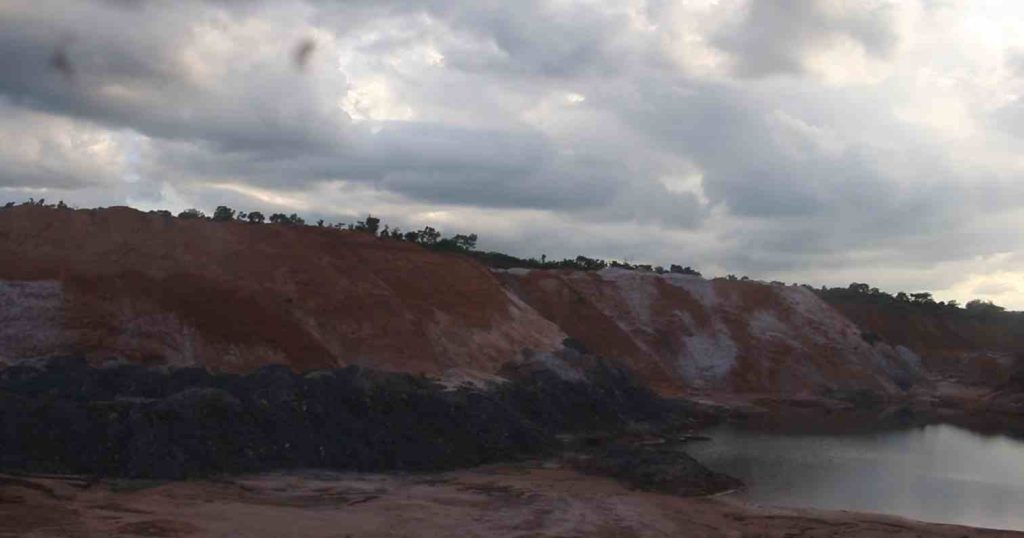
Though the ESIA projected the pollution of surface and groundwater due to acid mine drainage (AMD) resulting in high concentrations of some chemicals such as Arsenic and Sulfuric Acid, findings by SouthernHerald showed the unflinching response of Dangote Coal Mines Limited on pollution contravenes the National Environmental (sanitation and Waste Control) Regulation 2009 and defines the requirement for water protection and surface water impoundment. The regulation listed some contaminants in the water sample as hazardous chemical products and dangerous waste constituents.
Investigation showed that the rivers that have served 18 rural communities and Otukpo for centuries are being poisoned by contaminants like Arsenic, Mercury, Lead, and Cadmium, which are in high doses. The eighteen indigenous communities and Otukpo are bearing the brunt of Dangote’s lackadaisical attitude, SouthernHerald found out.
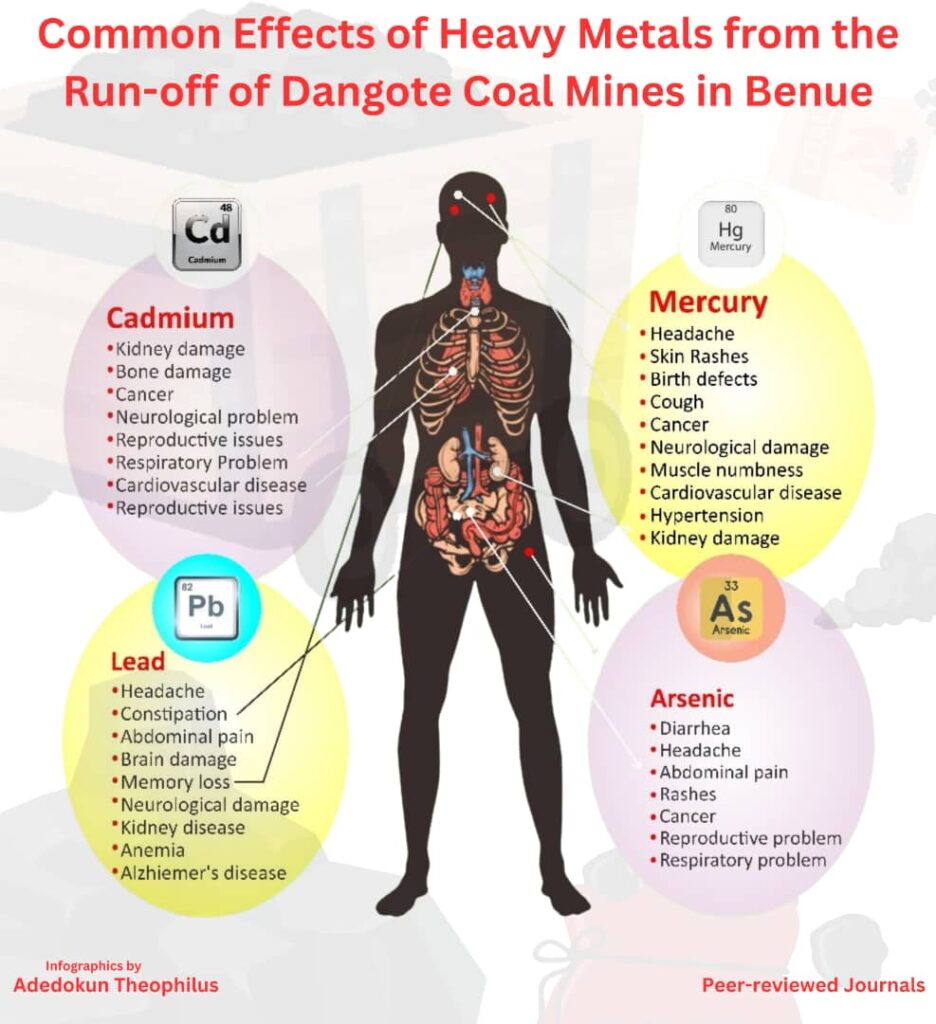
Infographics showing some health implications of Dangote pollution to Indigenous communities. Photo credit: Adedokun Theophilus
Experts noted that policymakers in developing nations should target interventions to enhance water security and reduce health risks. Reinnet Awoh, a public health physician for the National AIDS and STI Control Programme (NASCP) told Southern Herald that polluters like Dangote Coal Mines Ltd, should be held accountable and a long-term purification measure. He stressed that the sensitisation and medical screening of the residents are essential to avert the long-term effects of heavy metals in the communities.
“In the long run, investing in water treatment facilities designed to remove heavy metals from the water will be necessary. These could serve the affected communities and ensure a clean, safe water supply.”
Environmental experts noted that many corporations that commit ecological crimes leave host communities helpless and impoverished. They stressed the need to protect the environment against all hazards and diseases plaguing the planet and safeguard current and future ecosystem health.
To overcome the menace of environmental problems like land degradation, a sustainable implementation of a development plan is necessary at various state levels, said Durodola Ogunesa, the Director of the Quality Assurance Directorate at the Polytechnic Ibadan.
The Executive Director of Renevlyn Development Initiative (RDI), an environment non-governmental organisation, Philip Jakpor, told Southern Herald that government interest in revenue generation jeopardizes host communities’ efforts to seek justice.
“They are helpless because they don’t know what to do or how to engage these corporations. Imagine poor people confronting a big company such as (Dangote), getting justice might become the problem because of the government’s interest to protect business above people,” he added.
Host but lost communities
Tale from the immediate host communities of Dangote Coal Mines Ltd – Effeche and Abache – are heartbreaking. Findings by Southern Herald indicate that the two communities have not only lost their pre-mining environmental beauty and serenity but also their social and cultural harmony, all due to the destructive and disruptive activities of Dangote Coal Mines Ltd.Tales
Though they were promised prosperity, the communities wallow in unplanned poverty due to the exploitative activities of Dangote, whose impacts are far-reaching.
Findings by Southern Herald at the mine site in Abache revealed that the once lush landscape and fertile farmlands have been disfigured since the commencement of mining by Dangote Coal Mines Ltd.
Mounds of tawny soil have surrounded the mining site as each scooped-out remained fresh. It reflects a depression as if a giant hand had reached inside the earth and turned it inside out, with hectares of land stripped bare of vegetation leaving bloody-red-brown sandy mountains of soil.

Pollution, dynamite blasting and erosion are making natives vulnerable to diseases and life tougher.
There are no obvious benefits of the mining, either in Abache – or Effeche. Coupled with this is the tragic fact that coal mining has contaminated every water source within and beyond the two communities. The situation is intense in Abache as building collapses are rampant due to incessant blasting.
A youth leader in Abache, ThankGod Onuh, bemoaned that the unceasing blasts from the coal mine have caused several buildings to have significant cracks.
He told Southern Herald that the only thing Dangote Coal Limited provided for Abache was a borehole, which he claimed stopped functioning a few months after construction.
“You can see that we are patching our houses. We even have a semi-flat that collapsed because of dynamite. There is no concrete development that the community has achieved. This borehole was constructed three years ago and the truth is that it brought out water instantly but stopped within a few months. However, we told them to repair it and there has not been a response.”
Southern Herald discovered remnants of crumbled buildings due to dynamite explosions. The mark of the destructive dynamite is in every home – gaping walls that were either recently coated with cement or with fresh cracks.
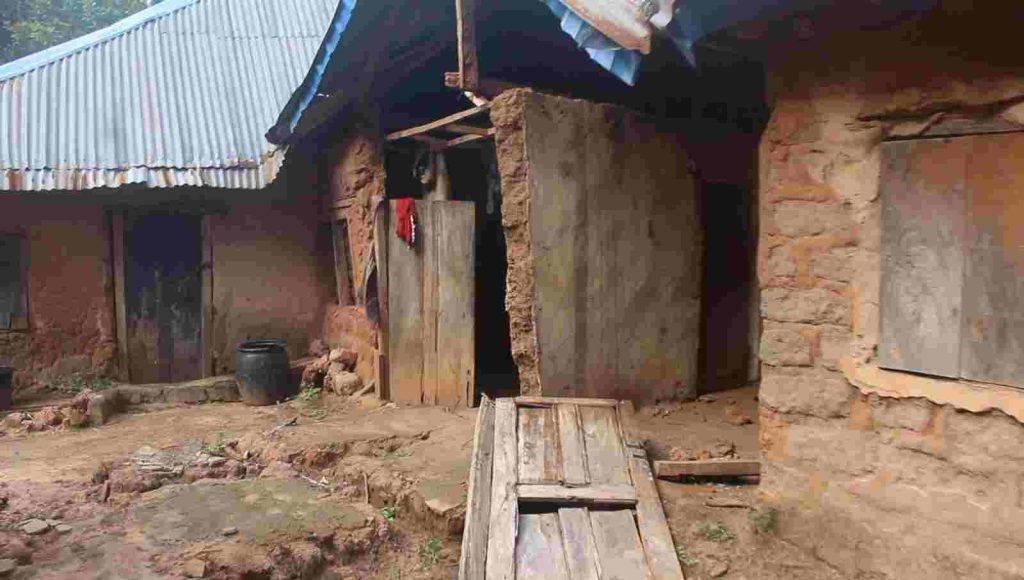
Another building shows a portion of collapsed walls in Abache village, linked to dynamite blasting. Photo credit: Adedokun Theophilus/ Southern Herald
Although former Senate President, Ameh Ebute, had sued Dangote at the Makurdi Division of the Federal High Court on the communities’ behalf and had got a mild favourable judgement, the community demanded a sum of N500 million in compensation for damages caused by Dangote. The company was ordered to compensate the host communities with a sum of 10 million naira.
The community is pessimistic about favourable outcomes. Onuh says, “They are telling us that Dangote is a big man and we cannot fight him. We don’t have money to fight him and he is wealthy and can do whatever he feels for the community,” Onuh told Southern Herald.
Question Marks on CDA
Mining began in Abache in 2021 but there is no agreement between Dangote and Abache, says Michael Ogu, the community’s secretary.
Emphasising that the company connived with some community members to have a verbal agreement rather than a written and signed CDA, Ogu denied the existence of a mutual agreement.
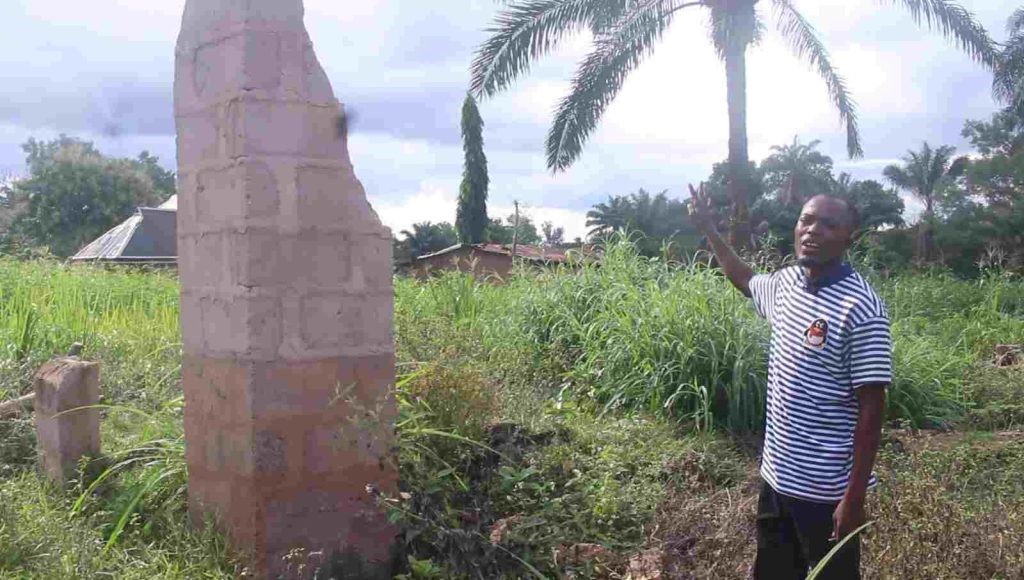
Thankgod Onuh showed Southern Herald the remains of a two-bedroom flat that collapsed after a dynamite blast. Photo credit: Adedokun Theophilus/Southern Herald
“What happened was that some of our members betrayed us with a verbal agreement with the company and they are members of this community and they are our brothers. We are separated as we are speaking because there is no written agreement and nothing like that was done. Dangote only promised that they would do it and that is why we are having a clash with Dangote. We have stopped their work for over two months now and they are in their fourth year of mining without CDA,” Ogu told Southern Herald recently.
Dangote marred Indigenous community with Devastation
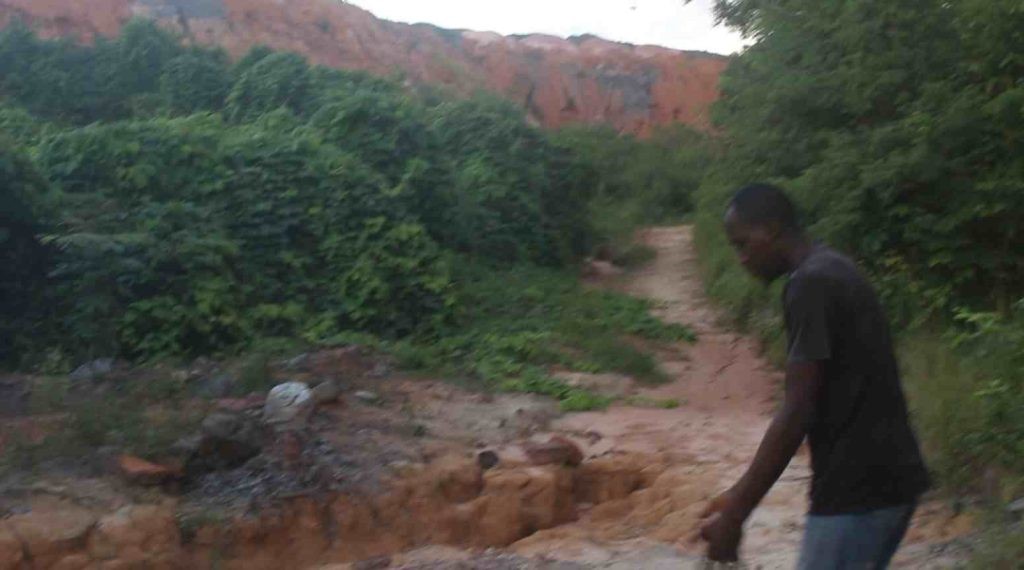
This used to be a vast, fertile farmland. The guide in the picture explains to Southern Herald Photo credit: Adedokun Theophilus/Southern Herald
Host communities complained about the radical alteration of their socio-economic life. Farmlands have been turned into mining sites, and many economic trees have vanished due to the change. Contaminants have destroyed the crops, cashews, palm plantations, and other cash crops cultivated along the Okollo and Umabe rivers. This implies that farmlands and economic trees spared from strip mining become casualties of mine-induced floods and chemicals, which withered them. Prevalently those within the banks of River Okollo and River Umabe.
Christopher Idengeli, a septuagenarian farmer, says, “The flood from Dangote has caused a lot of damage to our economic trees like palm trees, cashews and bananas; they are being killed and many of them have died, including cassava farms, and we were not given compensation concerning that.”
He bemoaned that their land had lost fertility, noting that it had taken a direct toll on his feeding. “Most of our land is grabbed or polluted, and it has lost fertility. The way we feed these days cannot be compared to years before Dangote mining operation. Most of these crops and our farm produce are being consumed by us here.
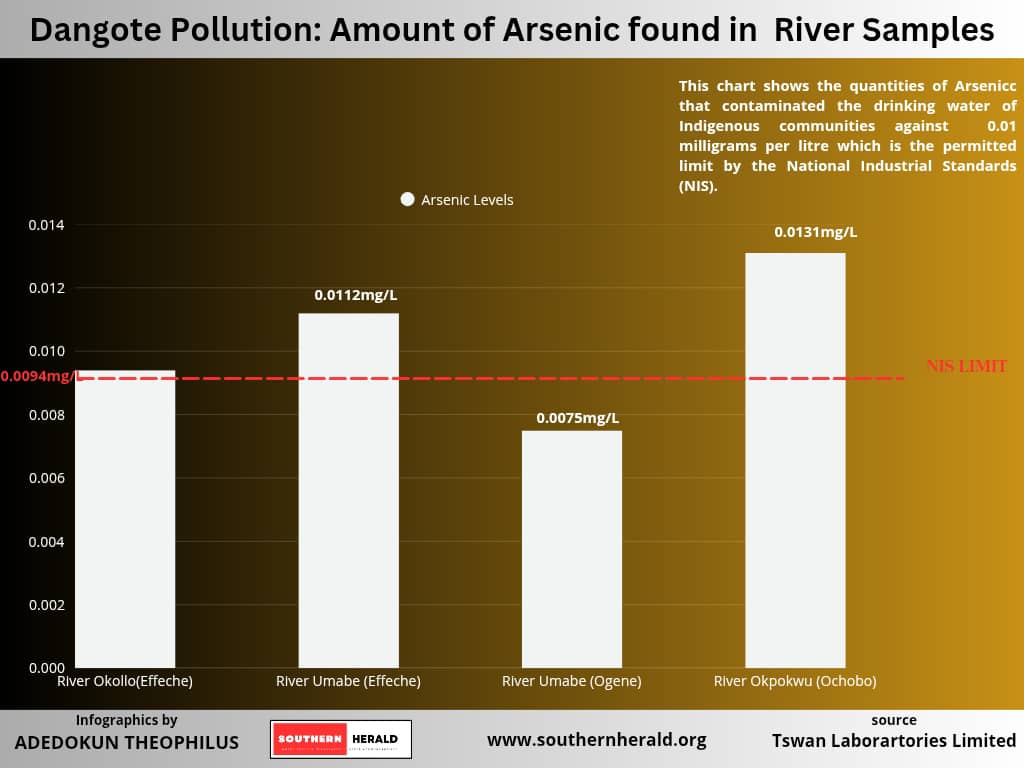
“But since there is not much land to farm, feeding becomes difficult. Those of us who ate three square meals before could barely afford one now. Our bodies are not as agile as before and we now think of survival only,” Idengeli lamented.
The irony is that the wealth from the soil of these communities is used to power plants that generate billions of naira in revenue, but natives languish in hunger, hardship and misery.
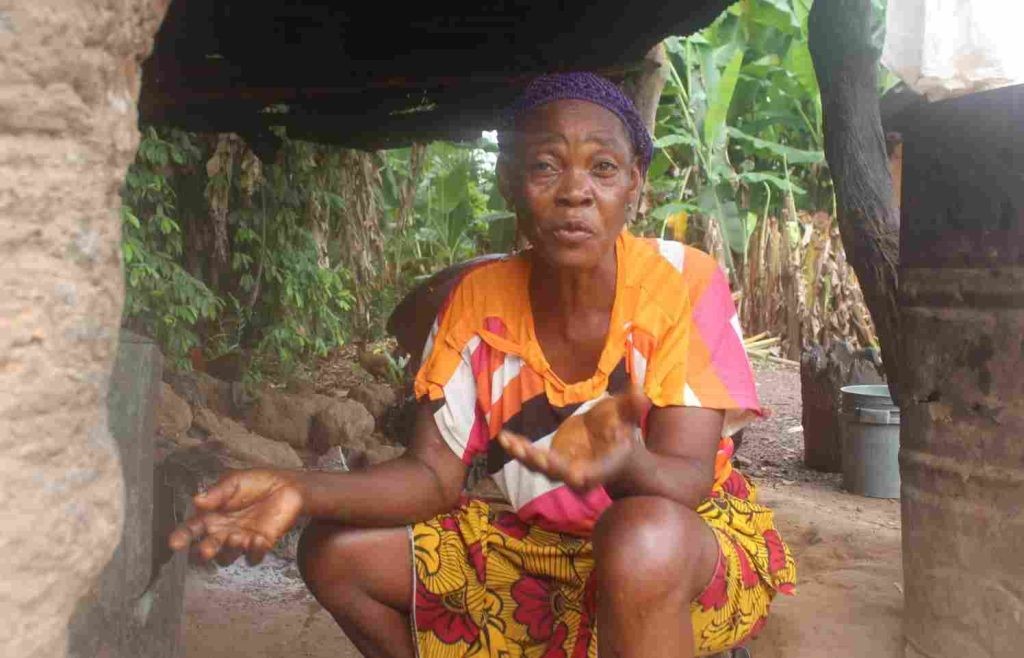
Moraine Idengeli, a 68-year-old farmer lost her farmland to a flash flood due to water released from the mine site. She became troubled after the incident.
“I recently had an operation and I’m still recovering. I am the one begging them to compensate me for my yam, water yam, cassava, corn,” Moraine said that she was prevented by Effeche-Akpali’s traditional ruler, Samuel Ameh, from accessing her compensation.
“I am unhappy; I don’t have money to buy from the market or sell food commodities. Akpali people blocked us from receiving palliatives and compensation from Dangote. I have been begging the representatives of Dangote for my benefits,” she said.
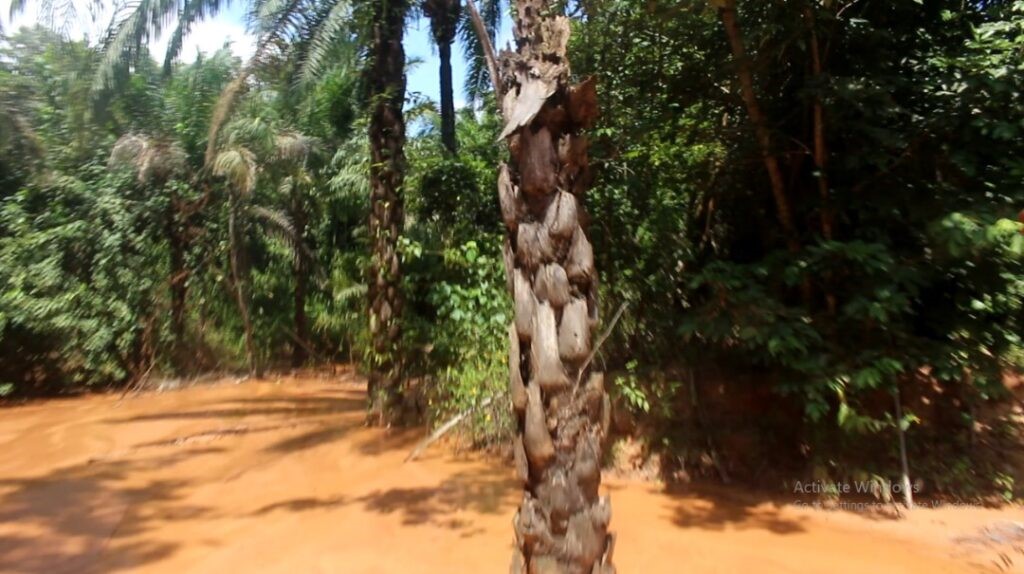
Dead economic trees by the bank of River Umabe in Effeche Akpali were destroyed by run-off contaminants. Photo credit: Adedokun Theophilus/Southern Herald
Anarchy, Displacement and Dispute over Land Ownership
Farmers who cannot cope with the dwindling farm produce are forced to migrate from their ancestral homes in search of livelihood elsewhere, multiple interviews by Southern Herald revealed.
Natives claimed that they had granted Dangote consent to mine. Paul Akaji expressed regret that their communities not only lacked basic infrastructure, but many natives had ended up in penury as the company’s takeover of their property.
Noting that clansmen have been waging violence against one another due to a land ownership tussle between Effeche and Akpali, he accused Samuel Ameh of evicting indigenes through assault, threats and claims that Effeche was not their home.
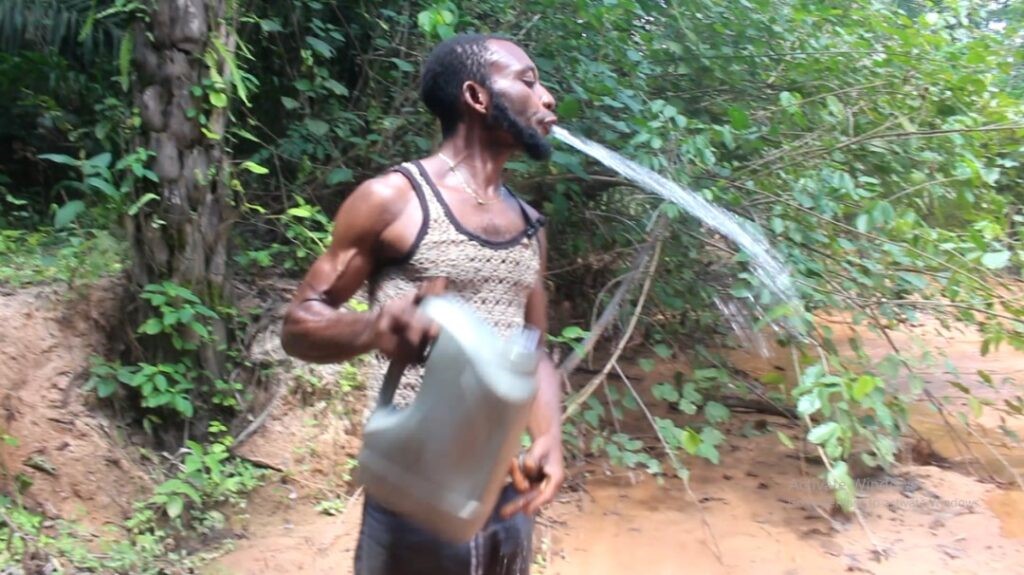
Paul Akaji, a farmer, spitting some of the contaminated water he drinks from the River Umabe. Photo credit: Adedokun Theophilus/Southern Herald
Investigation showed that these evictions have forced some Indigenous members of the host communities to leave their ancestral land in search of homes elsewhere. “They didn’t compensate me but they gave my uncle some amount and I bought a motorcycle from that money. However, the other community head (Samuel Ameh) and Dangote connived to send their boys to attack me and burn my motorcycle,” he alleged.
“A few months ago, if they see you here with me, they would come and beat me, saying that I am a stranger in this land,” Akaji told Southern Herald.
The Four Cs: Committee, CDA, Compensation and Corruption
An Indigenous organisation in the District, Edumoga Youth Movement (EYM), began the initial resistance against the non-environmental operations of Dangote coal mining exploration that resulted in pollution when it began in 2020.
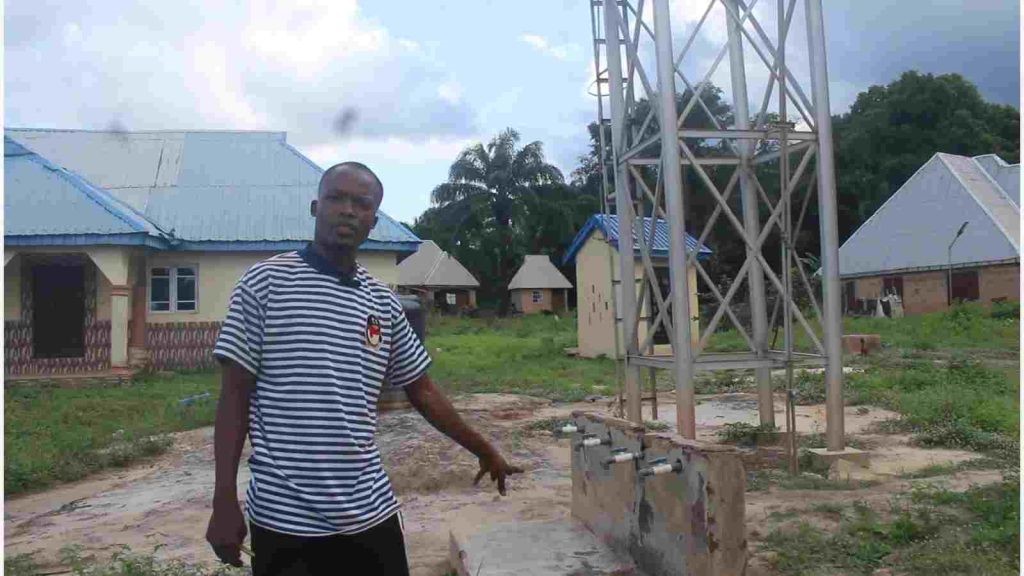
Thankgod Onuh pointed at the non-functioning borehole. PC: Adedokun Theophilus/Southern Herald
An ad-hoc committee consisting of 9 members was set up to assess the extent of pollution affecting the populations that depend on these rivers. The committee was responsible for evaluating the magnitude of damages that were caused and proffering sustainable recommendations. Two Dangote Coal Mines representatives were members of the committee, namely Engineer Faniyi Segun and Surveyor Samuel Okonkwo, a document obtained by Southern Herald showed.
The committee recommended the provision of potable water. It was approved by Dangote Group, a document obtained by Southern Herald and signed by Surveyor Okonkwo in July 2020, showed.
Troves of documents obtained by Southern Herald showed that Dangote failed to implement the committee’s recommendation and none of the villages has access to either boreholes or any other alternative water sources.
Fishermen whose subsistence was linked to the polluted rivers lost their livelihood.
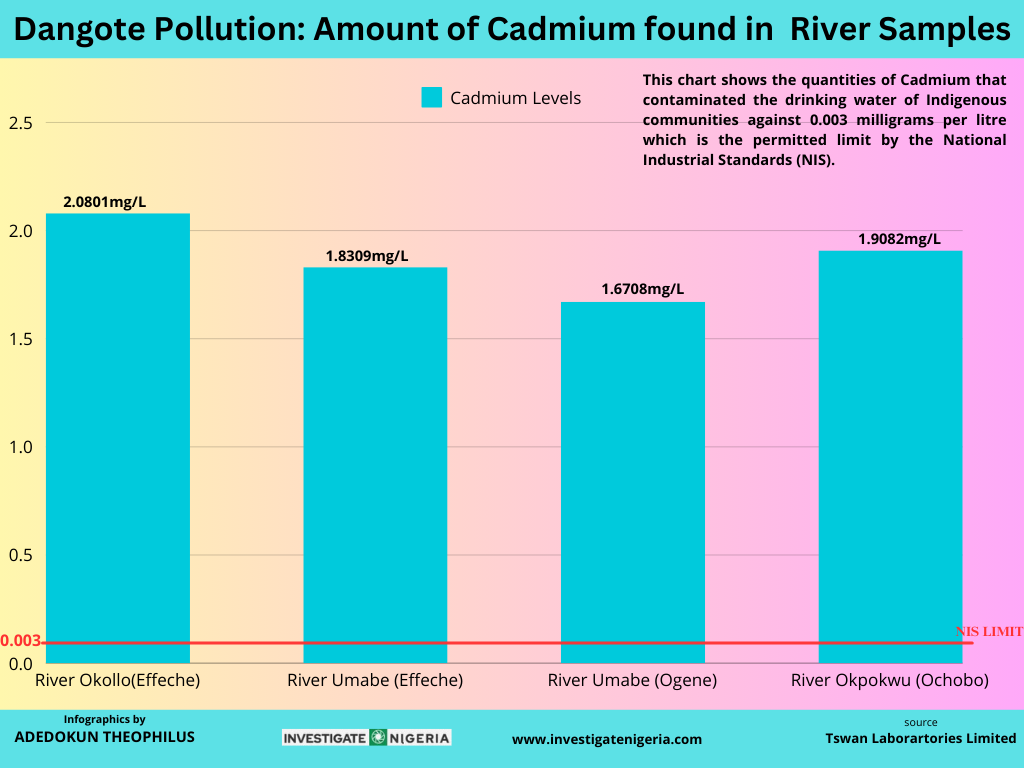
Dangote did not construct any borehole in the communities affected and members of the committee compromised by obtaining the sum of 100 thousand naira from the company monthly,” Godfrey Owotikwu, the national president of EYM, told Southern Herald.
Apart from the bribes paid to committee members, he alleged that traditional rulers were paid which ended the prospect of boreholes’ provision.
It was reported that traditional chiefs are on Dangote’s payroll. A sum of eighteen million naira was obtained from Dangote by a traditional ruler in Okpokwu LGA, Chief James Okefe. This amount is different from the bribes paid to compromised members of EYM.
Though Effeche community members denied the existence of a proper CDA, a copy obtained by Southern Herald showed that one exists.
The document showed the company has not fulfilled its legal obligation of providing the host communities with the benefits.
Corporate Social Responsibilities Shrouded in Secrecy
A document by the Nigeria Extractive Industries Transparency Initiative (NEITI), entitled “Approved List of Active Pre-January 2021 Community Development Agreements”, does not reveal any CDA between Dangote and host communities.
Southern Herald obtained CDA’s copy that Dangote Coal Mines Limited and Effeche-Akpali signed in March 2020, showing the failure of Dangote to actualise its obligation. Articles 1 to 6 of the agreement noted that Dangote should provide potable water, health care centres/clinics, vocational training centres, scholarships, micro-credit schemes, monthly lump sum and yearly compensation to affected farmers, electricity, allied infrastructure like roads and employment opportunities for community members.
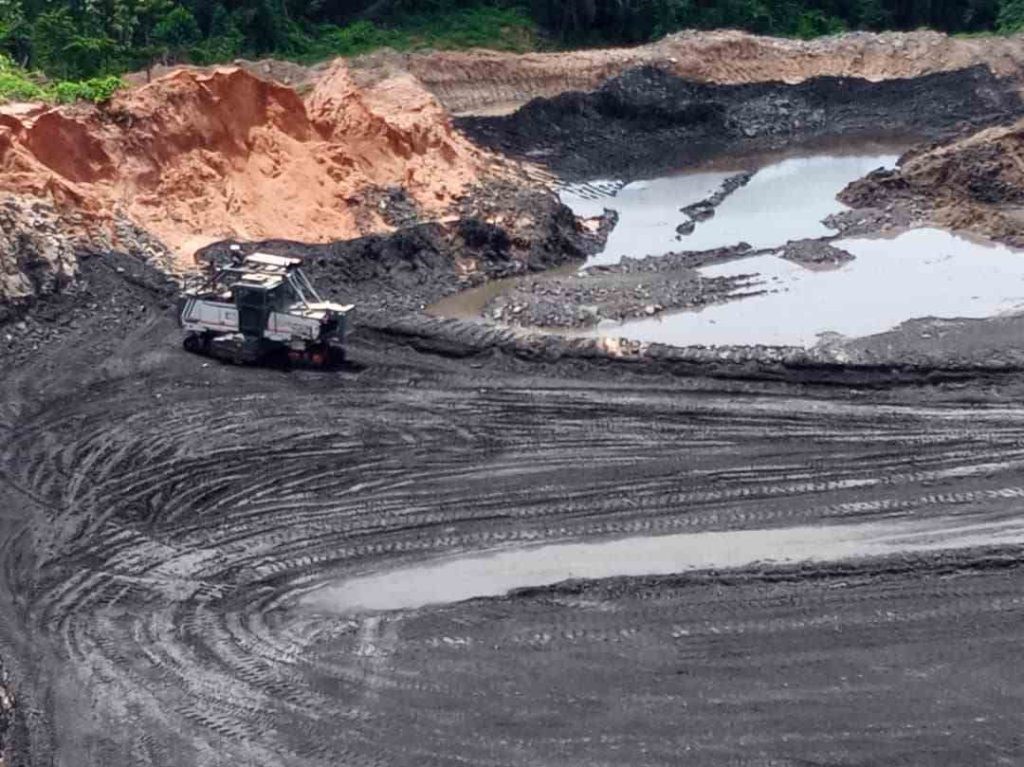
But of all the obligations in the CDA, Dangote Coal Mines only provided three: a scholarship worth 1 million naira annually shared among 10 host community members, a non-functional borehole, and electricity for the community. This breach violates the Nigerian Minerals and Mining Act (NMMA) 2007 and the Nigerian Minerals and Mining Regulation (NMMR) 2011.
Southern Herald could not provide information because page 6 of the CDA between Effeche-Akpali and Dangote Industries Limited was missing. An insider from the company confided in Southern Herald that page 6 was removed by Dangote because it contained information that would indict the company’s management concerning beneficiaries that were short-changed.
The only infrastructure in the community seen was non-functional boreholes in Abache and Effeche.
“The CDA signed by the company and host communities had helped accelerate the provision of infrastructural development around the host communities,” said reports. These lauded achievements are untraceable and unverifiable.
Violations: Traditional Chiefs, Rulers cash-backed by Dangote
Speaking on the CDA between Dangote Coal Mines and Effeche-Akpali to Southern Herald, the village head, Samuel Ameh, affirmed that the community benefited in terms of scholarships and electrification, but could not account for natives who benefited from the scheme. He is unable to provide a copy of the CDA.
“I cannot provide you a copy of the CDA and members who benefitted from the scholarship,” he said, stating that the company built “blocks of classrooms”. Ameh confirmed that traditional chiefs are being paid monthly stipends.
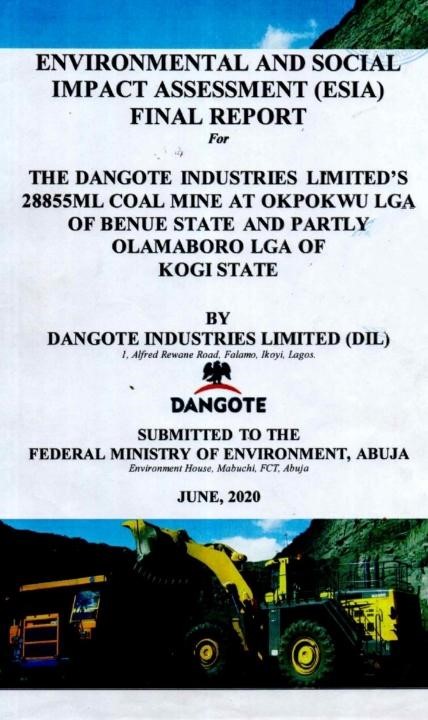
“They pay me 70 thousand naira monthly but we have stopped it since June. They brought a paper for us to sign but backdated the agreement to 2020 which is not supposed to be. I have received 70 thousand naira every month since their commencement, community chairmen and heads are paid between 20 thousand and 30 thousand naira,” Ameh said.
Revealing that Dangote and Effeche Community are at loggerheads, Ameh explained that doubts surrounding the status of the Company’s ESIA and CDA made the community halt its mining operation.
Ameh’s disclosures confirmed our findings that Dangote Coal Mines Limited lacked an approved ESIA, which is against section 15 of the NMMR (2011) that emphasises that an approved ESIA is mandatory before operations.
Sources in the Federal Ministry of Environment, who pleaded anonymity, independently disclosed to Southern Herald that the activities of Dangote Coal Mines in Benue had been approved ESIA. This source explained that the ESIA document presented by the company is not approved by the Federal Ministry of Environment.
Assassination, Communal Clashes Fester
Apart from the operation triggering waves of displacements and disunity, a series of assassinations and intra-communal violence have erupted since the mining began.
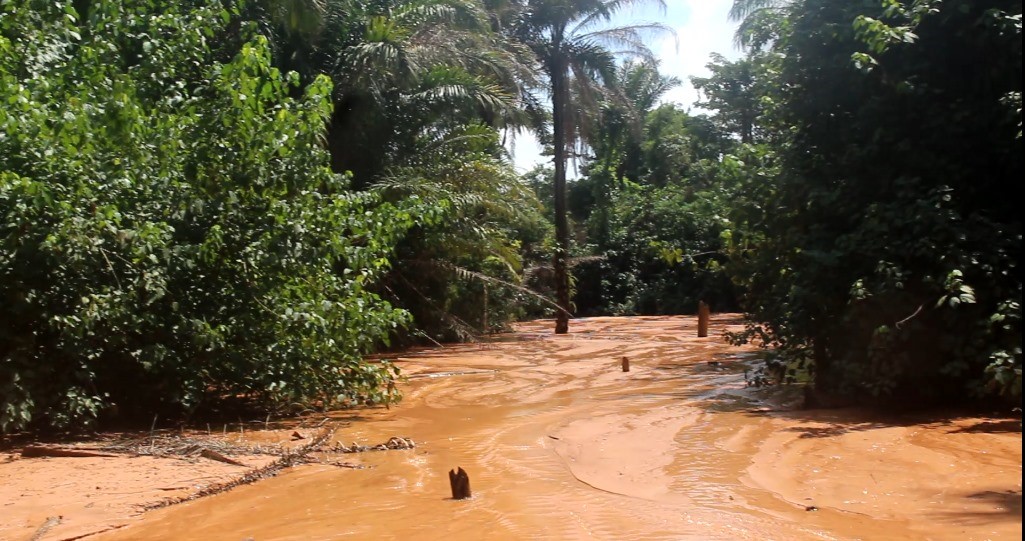
Southern Herald found that Effeche and Abache villages had become hotbeds of communal clashes and violence. These conflicts led to the assassination of a native of Abache and lecturer at Benue State Polytechnic, Joseph Onuh.
Onuh was allegedly ambushed, beaten to a pulp and abandoned on the road. He was confirmed dead at the University of Nigeria Teaching Hospital, Enugu.
His violent death was followed by a series of unrest across neighbouring communities.
Recalling his ordeal from other clanmen aggrieved with his unending quest to secure compensation and environmental justice, Fedoje Oguche, a native of Effeche, alleged that Samuel Ameh of witch-hunting and attempting to murder him because he pursued justice and accountability on compensation.
Narrating how he escaped through an inch when Samuel Ameh allegedly sent members to abduct him, he lamented that his phone was lost during the incident.
Interviews confirmed that this incident and Ameh’s eviction efforts.
Reacting to these allegations, Ameh claimed that the occupied farmlands by Effeche Community belonged to his primogenitor. “My great-grandfather gave them the land to farm and I can evict them and collect back the land,” while denying the existence of any legal documents to support his claims.
All We Know about Dangote Coal Mine Ltd and Dangote Industries Ltd Status
It is a statutory requirement that any company in the solid mineral industry that intends to mine must obtain and acquire the requisite certifications and licenses. These cut across relevant federal government ministries, agencies, departments and parastatals. Among these is the Mining Cadastre Office (MCO), an agency responsible for approving mining leases.
MCO granted Dangote Industries Ltd (DIL) approval to mine coal in Olamaboro LGA in Kogi State on Thursday, February 21, 2019. Approval seems to have shifted to Okpokwu LGA of Benue State. This finding indicates that DIL or Dangote Coal Mines Ltd lacked the exclusive right to mine coal in Benue communities, especially where it is doing so now in Effeche-Akpali and Abache.
The letter, signed by A. H. Damagum on behalf of the Director General of MCO, revealed that the mining lease number is 28855ML and the number of cadastral units is 225. Although the geographical coordinate provided on the document showed a different location which is Olamaboro LGA of Kogi State, a list of companies published on December 31, 2023 by MCO showed that DIL possessed a valid mineral title to mine coal and clay in Benue State.
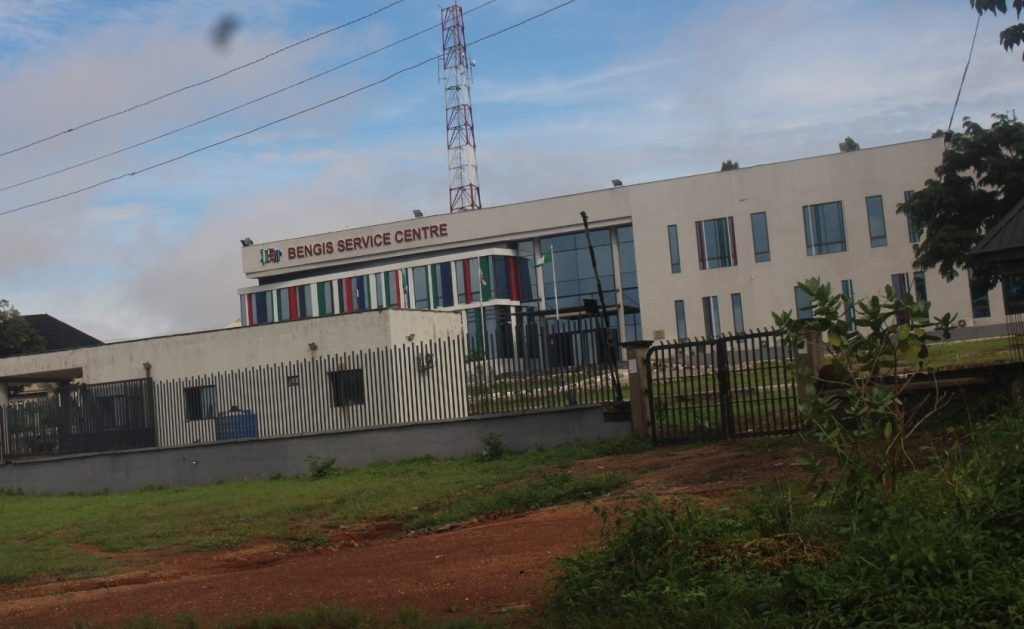
Southern Herald checked the open portal of the Ministry of Solid Minerals Development’s Integrated Automation and Interactive Solid Minerals Portal (IAISMP) to ascertain if either Dangote Coal Mines or DIL are duly licensed by the ministry.
Multiple searches on the portal showed that Dangote Coal Mines Ltd does not exist. Searches on the portal, however, showed that ‘Dangote Industries Limited’ exist across nine areas in Kogi and Ogun states.
Southern Herald found that Dangote Cement Company Plc is a legally backed company with an active mining lease in Benue State but the company is leased for limestone in Gboko LGA.
Although Dangote Industries Limited was established in April 1985, it is considered active in doing business in Nigeria by updating its annual returns to the CAC.
Contrarily, Dangote Coal Mines Limited, founded in August 2016, was marked inactive, indicating a failure of the company to comply with Sections 417–424 of the Companies and Allied Matters Act (CAMA).
Cashing out from Indigenous Communities: State Ministries, Dangote Swindling Natives with Ghana Mining Law
Mining of natural resources and solid minerals remains the exclusive right of the Federal Government based on the 1999 Constitution but the Land Use Act of 1978, and the Public Lands Acquisition Laws of states specify the procedures that a state must overseas plan and implement measures to compensate the affected people.
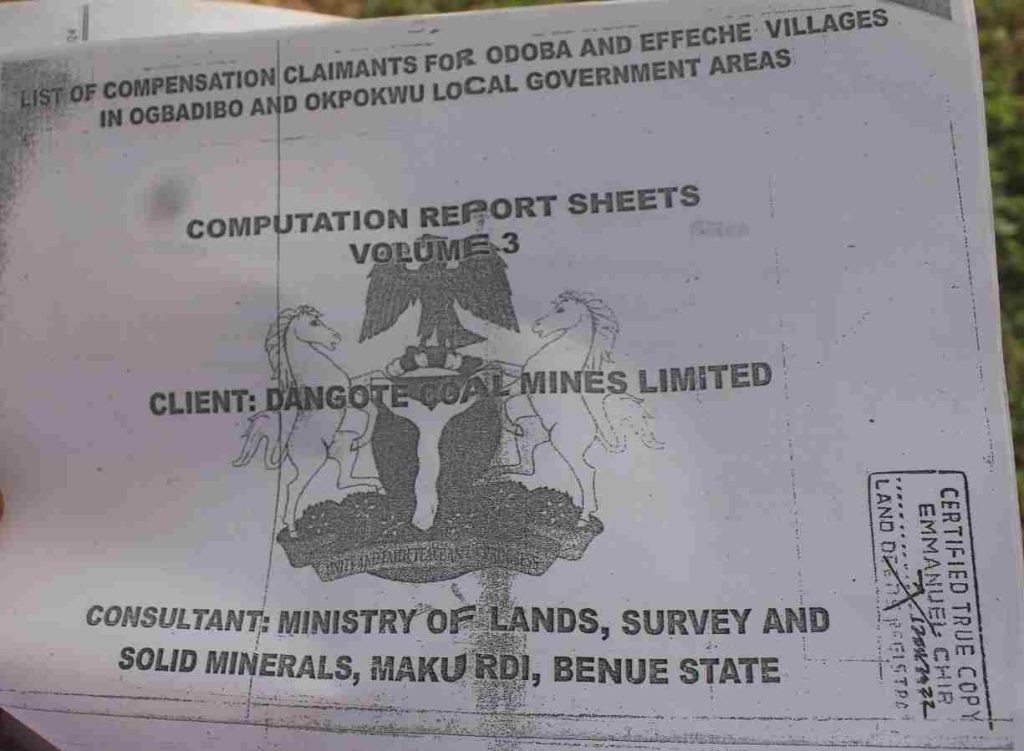
Certified True Copy of the list of compensation claimants Photo Credit: Adedokun Theophilus/Southern Herald
The compensation of affected farmers was carried out by the Benue State Ministry of Land and Solid Minerals. It was expected to be under the regulatory provisions of Nigeria and Benue State but a Certified True Copy (CTC) of the list of compensation claimants, titled: “Computation Report Ghana Mining Law cited a regulatory provision for farmers in NigeriaVolume 3 for Odoba and Effeche Villages in Ogadigbo and Okpokwu Local Government Areas,” showed otherwise.
The document was approved by State Land Deed Registrar, Emmanuel Chir, and it showed that valuation was conducted with the Republic of Ghana Minerals and Mining (Compensation and Resettlement) Regulations, 2012 (L.I 2175) to swindle affected farmers of their benefits. This contradicts the Land Use Act 1978 provision in line with NMMR and NMMA. The sizes of farmlands and geolocation were also not recorded, while affected farmers were missing from the list.
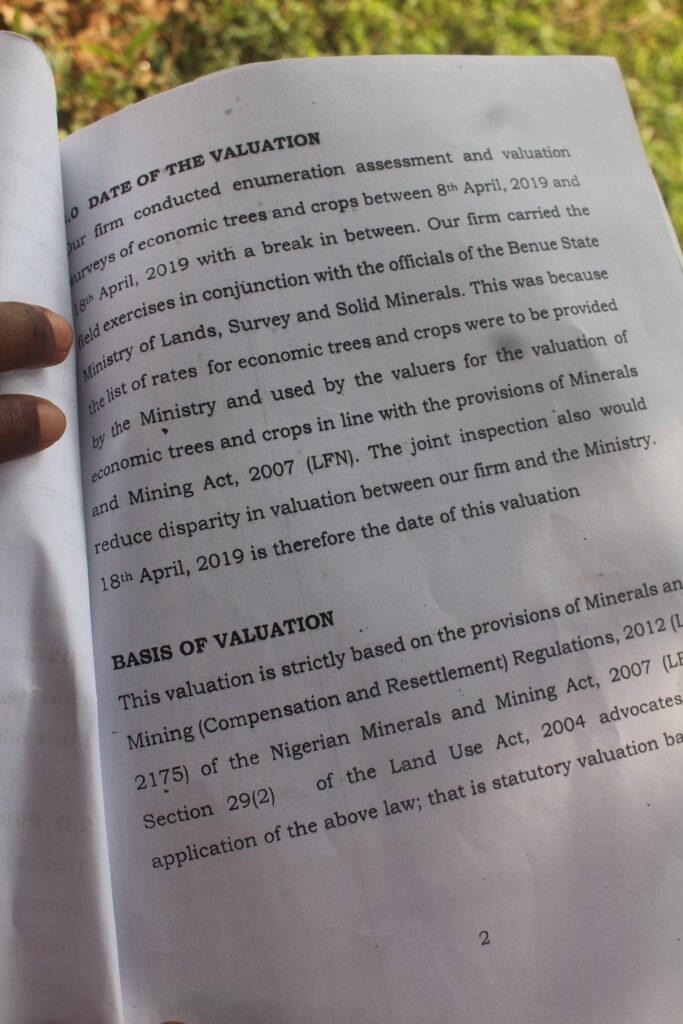
A letter submitted to the State Ministry of Land and Survey, Makurdi, in April by the Ai’Akaji family alleged that the names of indigenous farmers and inhabitants were removed and replaced with non-members of the community. The family stressed that missing volumes of the compensation list were made inaccessible because of the level of corruption in the compensation of indigenous farmers.
The letter reads in part: “Finding from Certified true copy of Dangote Coal Mines Limited, volume 3 of the compensation list and related document attached to CTC request released to us by Ministry of Lands, Survey and Solid Minerals, Makurdi on April 12, 2022, and September 13, 2022 respectively, indicated 28 members of Al’Akaji Ebbeh Family as lands owner (individual’s lands owners). [sic]
“However, many names of our family members and members of Eheche (Effeche) Olaiakaji community who are land owners are missing on the volumes 3 compensation list.”
The fraud in the compensation process and disparities in payment make the conditions and circumstances of affected farmers dire, since the company ejected them from their ancestral land without proper compensation.
Findings showed that Dangote Coal Mines Limited deducted 30% of each affected farmer’s compensation sum without the prior approval of Effeche members.
Oguche Fedoje believes that the reduction of their compensation was intentional and a reward to compensate others for connivance.
Southern Herald contacted the erstwhile Head of Enumeration and Valuations of the state’s Land and Survey Ministry, Agaba Opita Peter. HE confirmed that they were commissioned to evaluate by Dangote Industries Limited, but denied hoarding the accessibility of enumeration documents.
“I retired from service on 15th December 2022. We were commissioned by Dangote Industries Limited and I suppose that all information is available with Dangote Industry Limited at their office at Ankpa,” Agaba said.
Speaking on the trend of corruption in the compensation and enumeration process, a director in the Benue State Ministry of Solid Mineral, Anselm Nege, noted that his ministry would investigate the situation, adding that the state has suspended all mining activities. “We know we issued the deed; we shall investigate and the state government would be happy for your support,” he said. Subsequent calls to Nege were answered by him.
That is not all, Southern Herald has revealed several statutory violations by DIL or Dangote Coal Mines Ltd, as the case may be, in areas of pollution, licensing, ESIA procedures, CDAs, and CSR, among others.
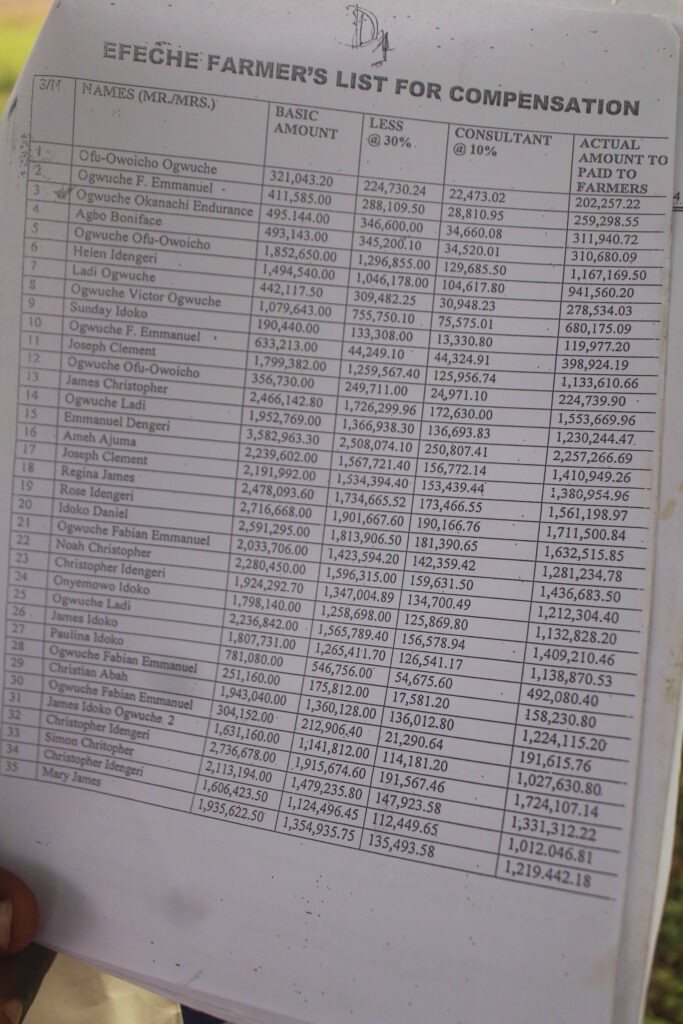
DIL says its CSR and HSSE are seen as drivers of environmental protection, but this investigation and, indeed, previous reports show the opposite. “We give utmost regard to safety, security of persons, preservation of operating environment and peaceful coexistence with host communities and the public,” it stressed in its ESIA document.
Everybody Goes Mute
To ascertain clarity on the alleged infractions, such as pollution, compensation issues, corruption, and internal disharmony in the host communities, Southern Herald reached out to the General Manager, Special Duties, Dangote MinesLimited, Nuhu Elujah, in September 2024 for the company’s reaction. Elujah declined to speak but directed that the information should be sent to Lagos.
At the time of filling this report, none of the messages had been responded to.
Several messages forwarded to the company by this reporter were not responded to. These findings were sent to the official electronic mail addresses provided to the public by the Mine Cadastral Office and National Environmental Standards and Regulations Enforcement Agency (NESREA) on Friday, November 1, but have not been replied to at press time.
This investigation is supported by the Wole Soyinka Centre for Investigative Journalism (WSCIJ) with funding support from the MacArthur Foundation.



Keep up the good work Theophilus Adedokun. Congratulations
Thank you, Faith Abeka